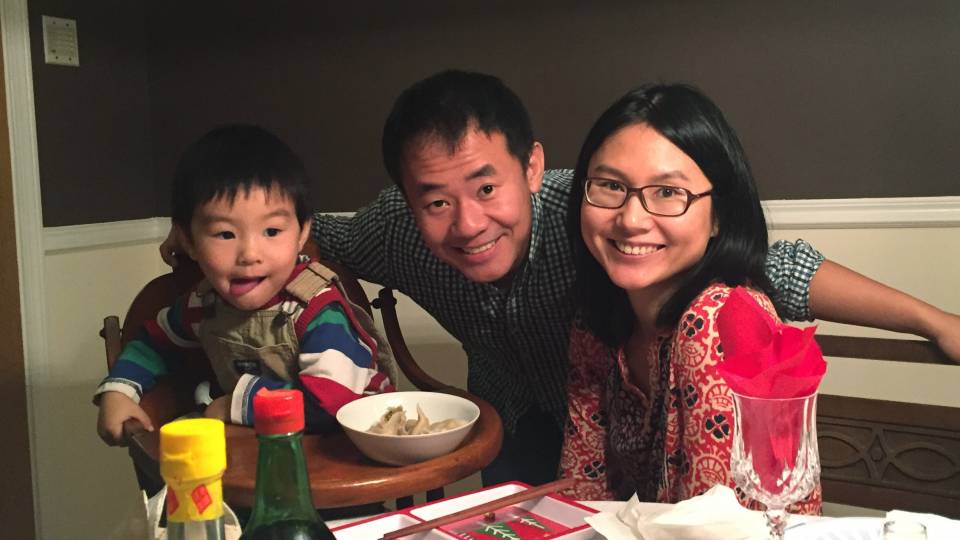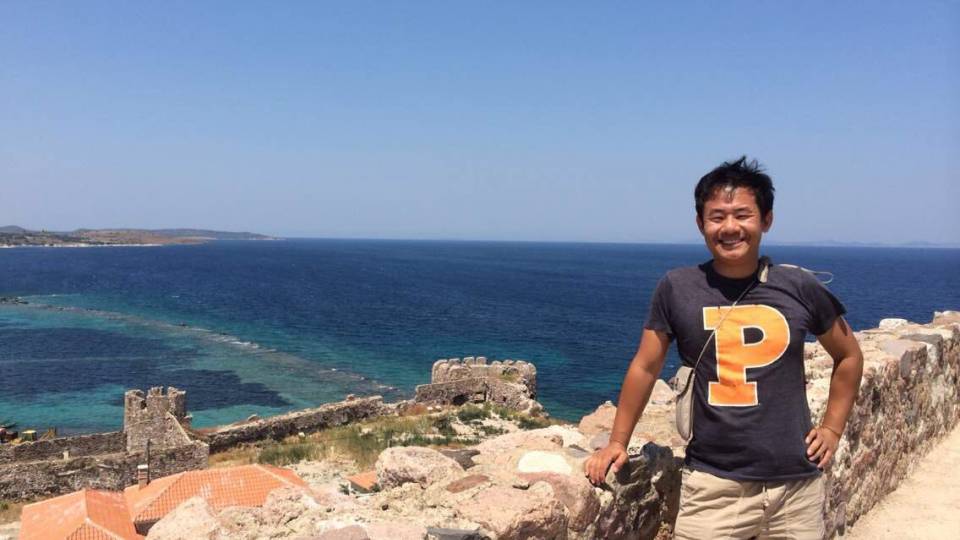Princeton graduate student Xiyue Wang, shown here with his wife and their young son before he was detained in Iran in 2016.
On August 7, 2016, Xiyue Wang, a fourth-year graduate student in the Department of History at Princeton University, was detained and confined to Evin Prison in Tehran. Wang, an American citizen born in China, was in Iran solely for the purpose of studying Farsi and doing scholarly research in connection with his Ph.D. dissertation in his field, late 19th- and early 20th-century Eurasian history. In February, Wang was charged with two counts of espionage and in April was convicted and sentenced to 10 years' imprisonment. An appeal is expected to be heard this summer.
His wife, Hua Qu, and their 4-year-old son, both citizens of China, have not seen him since he left for Iran more than a year ago. What follows is an account of an interview Qu gave recently on Wang's upbringing, his scholarship and their family life.
Portrait of a young scholar
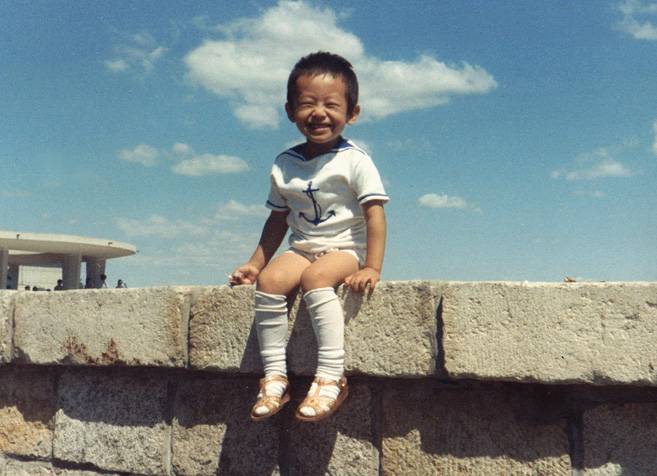
Wang grew up in Beijing, where his love of languages was fostered through his grandfather, who was an editor and illustrator at the Foreign Language Institute in Beijing.
"I think his grandfather had the biggest influence on him," Qu said, referring to her husband's childhood years in Beijing. "He adored him. His grandfather was the editor and illustrator of the French version of a Chinese magazine at the Foreign Language Institute in Beijing."
Wang's grandparents lived with his family in a compound of office buildings and residences near the institute. "His grandfather would pick up Xiyue from school because his mom and dad were very busy at work — his mother was a fashion designer and his father was a stage designer for the theater," Qu said. "So they spent a lot of time together, and they would often visit his grandfather's office. Xiyue got to know all the editors at the Foreign Language Institute."
By age 13, Wang's love of languages had become a passion, and he developed a fascination with India and Southeast Asia. He became interested in Indian culture and languages — including Hindi and Urdu — after befriending his neighbors, Chinese diplomats to India who read him stories about India.
These visits "began to deepen his curiosity to know more about India," Qu said, "and so he started looking for classical Indian literature and related books. He first learned about Hindu culture, then expanded to Muslim culture, and then to other areas linked to Mongolia, including the vast area across Central Asia."
Exploring India
One of the pivotal points in Wang's life came in 1999, when the prime minister of India came to Beijing. The 19-year-old Wang paid close attention. The prime minister was offering two inaugural scholarships to study in India: one for language, one for dance. Wang — then a business major at a Beijing university — applied and received the language scholarship.
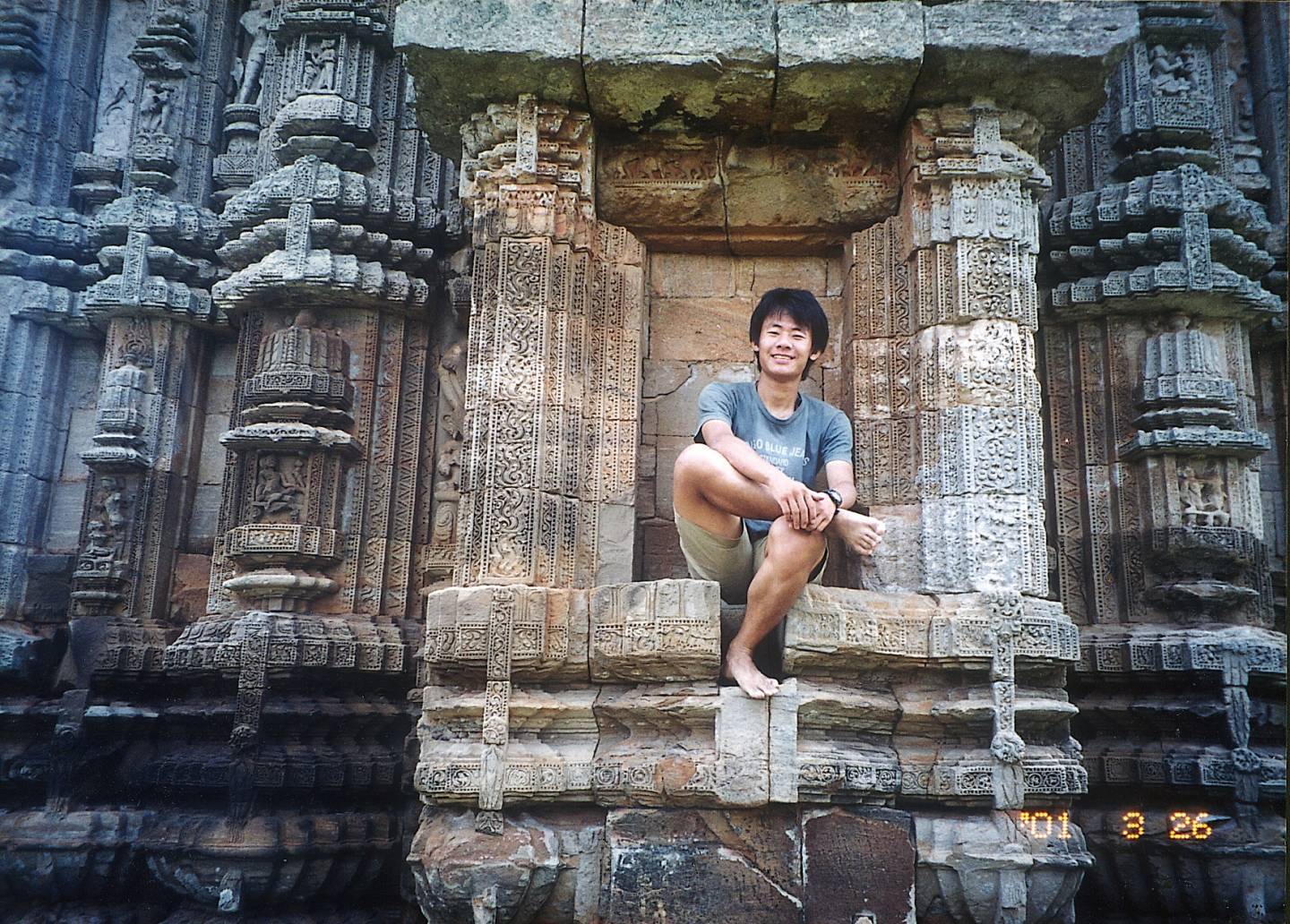
At age 19, Wang was awarded a scholarship to study language in India, where he immersed himself in the culture and history of the region.
When he got to India, he lived in a tiny apartment. But he was finally living in a country he had only experienced through the pages of books. In the searing heat, he would leave the windows open to catch whatever wisp of breeze there was. One day he was surprised to find a monkey in his closet.
Wang’s interest in the region continued to deepen. After his India experience, he knew that he wanted to pursue studies on global history and moved to the United States, where he earned a bachelor’s degree in international studies and history at the University of Washington in 2006.
Qu said Wang's academic focus began to center on Eurasia in the late 19th to the early 20th century, from China's Qing dynasty to the Russian empire to the Persian empire and British influence in central Asia. He earned a master's degree in Russian and Eurasian studies at Harvard University in 2008.
Wang would travel to China during summers and reach out to professors in his field at universities in Beijing, Qu said. He also began to study Pashto, one of the two official languages in Afghanistan, on his own and with professors in China.
The path to Princeton
After Harvard, Wang had his sights set on entering a doctoral program. He wanted to work as he considered precisely which type of research he wanted to do, Qu said.
He learned about Princeton in Asia, a 119-year-old program that connects college graduates to partner organizations in Asia for cultural immersion. In summer 2008, the program granted Wang a year-long fellowship as a legal assistant at a law firm in Hong Kong — where Qu, a Beijing native who had studied law at Peking University and Columbia University, also worked.
The two were "just colleagues," Qu said, until they met at a farewell party a few days before his fellowship ended. The two talked at length and decided to reconnect in Beijing, where Qu was heading to work as a lawyer.
Wang briefly stopped home to pack before starting a job as a translator for the International Committee of the Red Cross (ICRC) in Afghanistan. The day before his departure, "I asked him out for lunch at a very traditional hot pot place in Beijing," she said. "We kept talking. We talked into the night.
"We found that our grandparents probably knew each other and had common friends because they lived on the same lane. He mentioned that his grandmother used to work in the community factory; part of our house had been rebuilt to be a small factory. This drew us closer.
"Xiyue knows so much about cultural history. [I was] very interested in everything he talked to me about — culture and history," Qu continued. "He's very funny. All my friends got to know him and they liked to hear his stories about spending time in so many different cultures, like India" where there were few Chinese people.
In Afghanistan, Wang worked in Kandahar at a hospital that the Chinese built in the 1950s and, Qu said, is still called "China Hospital." Wang translated for the wounded from Pashto into English or French for the European doctors and nurses.
After one year, he returned to China — and Qu — and began to plan his return to academia. "He knew he wanted to take a historical comparison approach to research," Qu said. " He wanted to study global history, and he wanted to work with Professor Stephen Kotkin, a distinguished historian at Princeton."
Wang and Qu were married on Jan. 5, 2012. At the ceremony, she presented her husband with a watercolor painting she had made as a wedding gift: a silver tree against a pure pink background. She said the painting was a symbol of romance — and the values she and Xiyue share: an intellectual life, the arts and spirituality.
Studies, commutes and child care
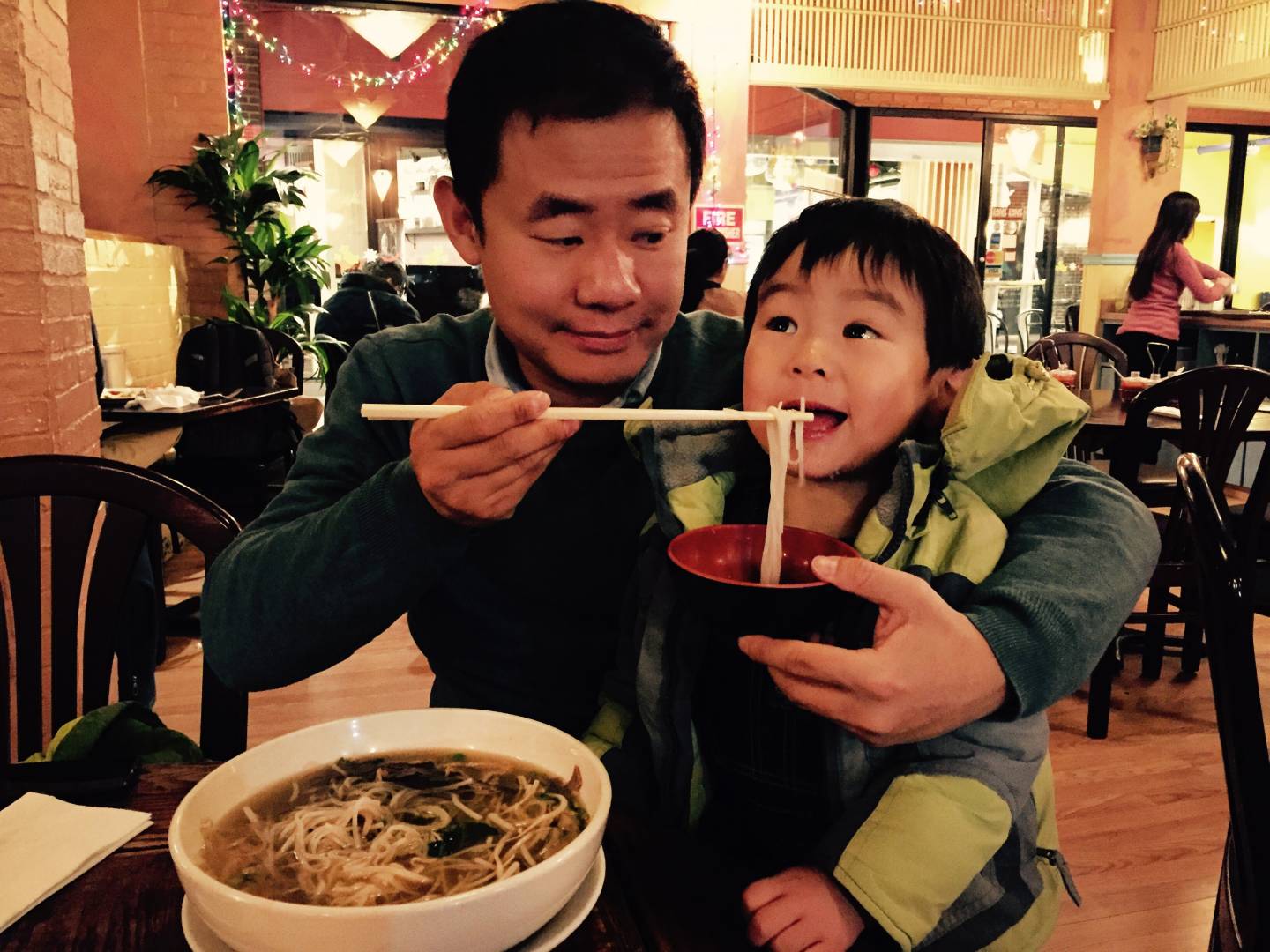
Wang enjoys a meal of noodles with his young son.
Wang was accepted at Princeton in 2013. After their son was born that year, he left Beijing for Princeton.
In October 2014, Qu was able to move with their son to Princeton. Eventually, she found a job in Manhattan — and spent four hours every day commuting.
"I was working so many hours in New York. And all my clients were in China, so I also worked from home and always one day on the weekend because of the time difference," Qu said. Wang also worked hard, but would come home as often as he could to spend time with their son.
While he cooked dinner, Qu would be at Penn Station, waiting for the train home.
"When I got home, it was almost 8 p.m. Then I would eat and we would put our son to bed," she said. "Xiyue was under the huge pressure of general exams. He read hundreds of books, because he covered three fields: Russia, China and the Late Ottoman Empire. After our son went to bed, Xiyue would study until 2 or 3 in the morning."
When they could find the time, she and Wang enjoyed taking their son fruit picking at orchards, going to museums, hiking along streams and nature trails, and flying kites. Wang, who loves to cook, would pore over recipes, she said, comparing several and coming up with his own version. "He's very picky about ingredients" and loves to cook for friends, she said. His specialties include Uzbekistan fried rice and dumplings made from scratch.
Wang shaped his dissertation research proposal — which focused on Eurasian culture and history in the late Imperial Era, from the late 19th century to the early 20th century — with excruciating attention to detail. He showed it to scholars at Harvard, Princeton, the University of Pennsylvania and Stanford University, all of whom, Qu said, told him "it was truly promising, potentially field-changing."
A double New Year's wish
Wang decided he would do research in several countries in Eurasia. He would go to Iran first, then spend time in Russia, and then go to London to examine archives related to British rule in Persia. As Christmas 2015 approached, Qu began to buy him "a lot of very warm clothes and down jackets" in anticipation of his time in Russia. On New Year's Eve, they each made a wish.
"His wish was to do rewarding archival research, to find something interesting, something innovative. He wanted to do good research and then he wanted to come back and never leave again," she said. "My wish was almost the same — because I came to the U.S. so he could be the scholar he wanted to be."
Wang sent letters explaining his research plan to the Iranian Interest Section in Washington, D.C., (which issued his visa) and to the libraries and archives in Iran that he planned to visit. Qu said he was transparent about what he wanted to study and why, and about his desire to access documents housed at Iranian libraries and archives.
Wang visited Iran between January 25 and March 10, 2016, attending a Farsi language program at the Dehkhoda Lexicon Institute & International Center for Persian Studies. After returning to Princeton to visit his family, he went back to Iran on May 1 to continue his language studies and conduct his dissertation research.
Qu said that the materials he studied are more than a century old "in handwritten script and different handwriting styles that can make the script unreadable, so that was quite a challenge for him."
During Ramadan from June to early July, Wang respectfully adhered to the Iranian people's customs. "He observed fasting together with them," she said. "He didn't eat and drink during the day" and spent hours in reading rooms with hundred-year-old manuscripts. He came to know and admire the Iranian people and their culture, and he appreciated the opportunity to study their rich history and language.
Hope: 'Baba is on that airplane'
While he was in Tehran, Qu took their son with her for a visit to China, then returned to Princeton over the summer, expecting him soon. In August, thinking he was boarding a flight home, she sent him a text message that went unanswered.
After many worrisome days, she finally learned he was sent to Evin Prison, where he has been held ever since. The only contact they have had has been short, periodic telephone calls.
Even after long months in prison, Wang remains focused on resuming his scholarly work. As the spring deadline approached to become a teaching assistant for the fall semester at Princeton, Wang urged his wife to do everything she could to bring him home so he could apply in time to teach in the Department of History.
"Even though he had been through solitary confinement, through all the difficult times, he was still thinking that he could come back in September so that he could be a TA for one semester, and then go to Russia," Qu said.
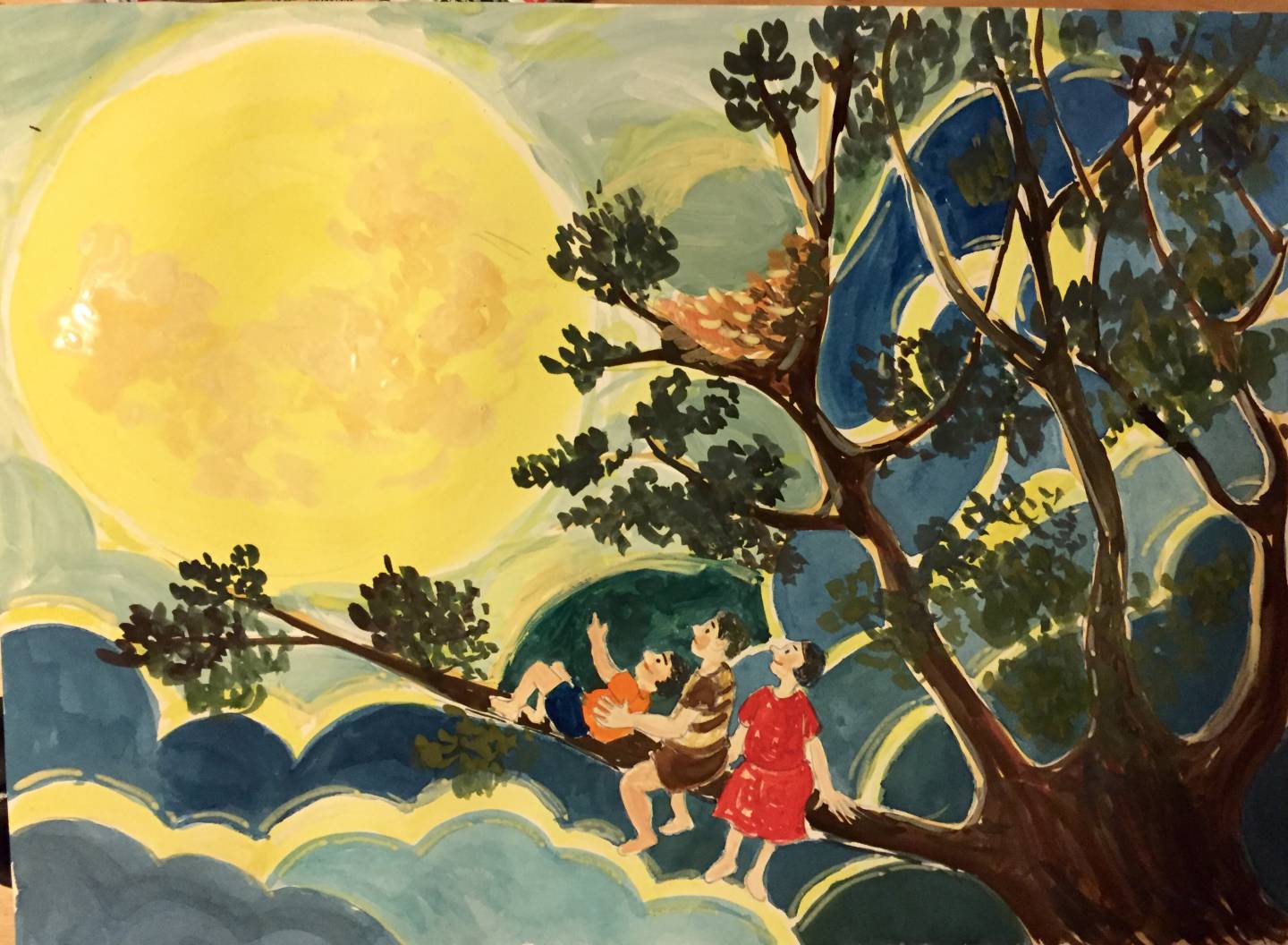
To help her feel connected to her husband, Qu has returned to watercolor painting. In this recent painting, she and her husband and son are reunited and enjoy the Chinese Mid-Autumn Festival.
As she anxiously awaits his return, she has started painting again to help feel connected with her husband. She has recounted the history of their relationship in a sketchbook, starting with their first trip together to India in 2010.
She also paints pictures to express her hopes that they will soon be reunited. In one, they sit with their son during the Chinese Mid-Autumn Festival and gaze at the full moon. These paintings make her feel closer to her husband.
Despite the challenges of taking care of him on her own, Qu's sense of hope centers on their child, who is 4 years old. "It is all about our son, because he's so little, and he's such an affectionate boy. My son is always positive.
“For my son, a year is like forever. Xiyue used to feed him, to hug him, to put him to bed. Now I don’t know if he can remember that simple daily life with his father, but I know he misses him," she said. "It’s hard to explain to a young child why his father can’t come home. I want him to understand the truth, but I also don’t want to scare him, so I try to talk hopefully with him.
"And he is hopeful. You can see airplanes and helicopters above in the Princeton area all the time. Every time he points to an airplane, he says, 'Oh, Baba is on that airplane.'"
Qu leans in and says: "I just want to express it is very difficult. There was a snowstorm on the day before Xiyue left for Iran, and he spent the afternoon playing in the snow with our son. As each season passes by, we feel Xiyue’s absence in our daily life. Our son is always longing for his father's return and makes up activities for them to do in every season: flying kites on a windy spring day, splashing in the summer pool, and hiking along mountain trails covered with colorful autumn leaves. Every month we are hopeful for something. But as of today, I'm still waiting."
A version of this story in Chinese is also available.

